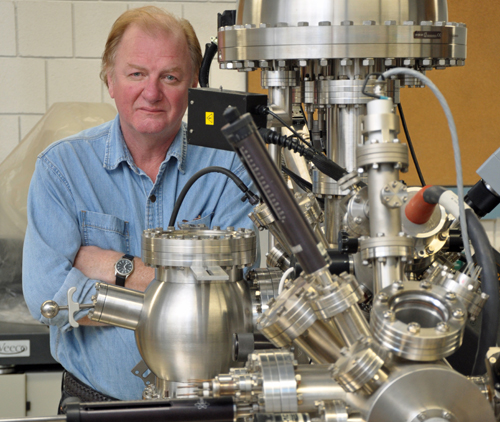
Chemistry professor Mark Baker considers himself “retro” for using chalk and a blackboard in his classes, but his students don’t seem to mind. His teaching style has earned him high praise from students and colleagues alike. He consistently scores 4.75 out of 5 or higher on teaching evaluations.
“People always ask me how come you get such good ratings in teaching,” says Baker. “It just seems like second nature to me as to how to present something.” His love of teaching is evident in his lectures and in his involvement in developing new courses and programs within the Department of Chemistry.
“I enjoy teaching very much,” says Baker, who compares lecturing to painting: “You want to create a masterpiece.” His 2011 John Bell Award recognized his masterful teaching, but he is more than willing to share the accolades. “The quality of teaching in the chemistry department is extremely high. We have a lot of excellent teachers in this department who have very good reputations.” He also received the University of Guelph Faculty Association Teaching Award in 1999.
Baker’s students come from a range of disciplines and have different learning styles, so he uses a combination of abstract and application-based concepts. Having taught chemistry at U of G since 1988, he says the course material comes naturally to him, yet he spends months preparing his lecture notes for each course. “One of the most important things to succeed in getting the message across to students is preparation. No matter how many times I teach a course, I always spend quite a long time before the lecture going through it page by page.”
Preparation, he adds, can make the difference between a good lecture and a bad one. As he reviews his lecture notes, he recalls which analogies worked and which ones didn’t. He gives his students detailed lecture notes, but that’s no excuse for them to skip class, as his lectures go beyond his notes.
Another key ingredient in Baker’s lectures is humour. He often starts his Friday classes with a funny YouTube video. Humour helps his students relate to him as a person, not just as a professor. “I think it’s important that they feel that they can come and talk to you about anything, not just science.”
Baker also covers the history of the theories he teaches. One of his favourite anecdotes is about the inventor of the Hamiltonian operator, part of the Schrodinger equation in quantum mechanics. When William Hamilton was a child, his uncle would wake him in the morning by pulling a string tied to his toe. Sharing these types of anecdotes with students helps them remember the people behind the theories.
Baker also encourages his students to learn from each other through tutorials and group work. He gives his students a series of problems to work on together and assigns each group a problem to teach to the class. Communication skills are just as important as knowledge of the material, he says, since many of his students will eventually work in positions requiring them to explain concepts. “The room gets very noisy, but I think that’s great because the students are actually engaging each other,” says Baker.“You’re forcing them to be proactive in learning.”
Students who think they can hide in a corner of the lecture hall may find themselves sitting next to Baker himself. He often “targets” shy students by approaching them and asking whether they have any questions. Sometimes he finds students who were struggling with the material and were just too shy to ask for help.